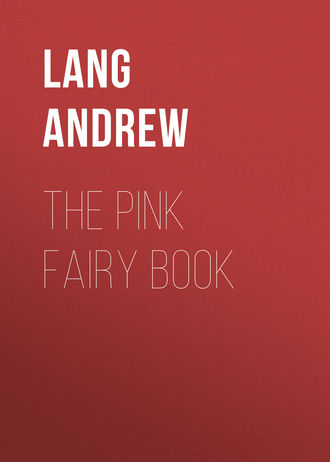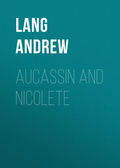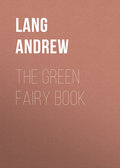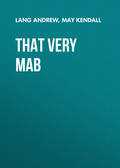
Lang Andrew
The Pink Fairy Book
The White Dove
From the Danish
A king had two sons. They were a pair of reckless fellows, who always had something foolish to do. One day they rowed out alone on the sea in a little boat. It was beautiful weather when they set out, but as soon as they had got some distance from the shore there arose a terrific storm. The oars went overboard at once, and the little boat was tossed about on the rolling billows like a nut-shell. The princes had to hold fast by the seats to keep from being thrown out of the boat.
In the midst of all this they met a wonderful vessel – it was a dough-trough, in which there sat an old woman. She called to them, and said that they could still get to shore alive if they would promise her the son that was next to come to their mother the queen.
‘We can’t do that,’ shouted the princes; ‘he doesn’t belong to us so we can’t give him away.’
‘Then you can rot at the bottom of the sea, both of you,’ said the old woman; ‘and perhaps it may be the case that your mother would rather keep the two sons she has than the one she hasn’t got yet.’
Then she rowed away in her dough-trough, while the storm howled still louder than before, and the water dashed over their boat until it was almost sinking. Then the princes thought that there was something in what the old woman had said about their mother, and being, of course, eager to save their lives, they shouted to her, and promised that she should have their brother if she would deliver them from this danger. As soon as they had done so the storm ceased and the waves fell. The boat drove ashore below their father’s castle, and both princes were received with open arms by their father and mother, who had suffered great anxiety for them.
The two brothers said nothing about what they had promised, neither at that time nor later on when the queen’s third son came, a beautiful boy, whom she loved more than anything else in the world. He was brought up and educated in his father’s house until he was full grown, and still his brothers had never seen or heard anything about the witch to whom they had promised him before he was born.
It happened one evening that there arose a raging storm, with mist and darkness. It howled and roared around the king’s palace, and in the midst of it there came a loud knock on the door of the hall where the youngest prince was. He went to the door and found there an old woman with a dough- trough on her back, who said to him that he must go with her at once; his brothers had promised him to her if she would save their lives.
‘Yes,’ said he; ‘if you saved my brothers’ lives, and they promised me to you, then I will go with you.’
They therefore went down to the beach together, where he had to take his seat in the trough, along with the witch, who sailed away with him, over the sea, home to her dwelling.
The prince was now in the witch’s power, and in her service. The first thing she set him to was to pick feathers. ‘The heap of feathers that you see here,’ said she, ‘you must get finished before I come home in the evening, otherwise you shall be set to harder work.’ He started to the feathers, and picked and picked until there was only a single feather left that had not passed through his hands. But then there came a whirlwind and sent all the feathers flying, and swept them along the floor into a heap, where they lay as if they were trampled together. He had now to begin all his work over again, but by this time it only wanted an hour of evening, when the witch was to be expected home, and he easily saw that it was impossible for him to be finished by that time.
Then he heard something tapping at the window pane, and a thin voice said, ‘Let me in, and I will help you.’ It was a white dove, which sat outside the window, and was pecking at it with its beak. He opened the window, and the dove came in and set to work at once, and picked all the feathers out of the heap with its beak. Before the hour was past the feathers were all nicely arranged: the dove flew out at the window, and at, the same moment the witch came in at the door.
‘Well, well,’ said she, ‘it was more than I would have expected of you to get all the feathers put in order so nicely. However, such a prince might be expected to have neat fingers.’
Next morning the witch said to the prince, ‘To-day you shall have some easy work to do. Outside the door I have some firewood lying; you must split that for me into little bits that I can kindle the fire with. That will soon be done, but you must be finished before I come home.’
The prince got a little axe and set to work at once. He split and clove away, and thought that he was getting on fast; but the day wore on until it was long past midday, and he was still very far from having finished. He thought, in fact, that the pile of wood rather grew bigger than smaller, in spite of what he took off it; so he let his hands fall by his side, and dried the sweat from his forehead, and was ill at ease, for he knew that it would be bad for him if he was not finished with the work before the witch came home.
Then the white dove came flying and settled down on the pile of wood, and cooed and said, ‘Shall I help you?’
‘Yes,’ said the prince, ‘many thanks for your help yesterday, and for what you offer to-day.’ Thereupon the little dove seized one piece of wood after another and split it with its beak. The prince could not take away the wood as quickly as the dove could split it, and in a short time it was all cleft into little sticks.
The dove then flew up on his shoulder and sat there and the prince thanked it, and stroked and caressed its white feathers, and kissed its little red beak. With that it was a dove no longer, but a beautiful young maiden, who stood by his side. She told him then that she was a princess whom the witch had stolen, and had changed to this shape, but with his kiss she had got her human form again; and if he would be faithful to her, and take her to wife, she could free them both from the witch’s power.
The prince was quite captivated by the beautiful princess, and was quite willing to do anything whatsoever to get her for himself.
She then said to him, ‘When the witch comes home you must ask her to grant you a wish, when you have accomplished so well all that she has demanded of you. When she agrees to this you must ask her straight out for the princess that she has flying about as a white dove. But just now you must take a red silk thread and tie it round my little finger, so that you may be able to recognise me again, into whatever shape she turns me.’
The prince made haste to get the silk thread tied round her little white finger; at the same moment the princess became a dove again and flew away, and immediately after that the old witch came home with her dough-trough on he back.
‘Well,’ said she, ‘I must say that you are clever at your work, and it is something, too, that such princely hands are not accustomed to.’
‘Since you are so well pleased with my work, said the prince, ‘you will, no doubt, be willing to give me a little pleasure too, and give me something that I have taken a fancy to.’
‘Oh yes, indeed,’ said the old woman; ‘what is it that you want?’
‘I want the princess here who is in the shape of a white dove,’ said the prince.
‘What nonsense!’ said the witch. ‘Why should you imagine that there are princesses here flying about in the shape of white doves? But if you will have a princess, you can get one such as we have them.’ She then came to him, dragging a shaggy little grey ass with long ears. ‘Will you have this?’ said she; ‘you can’t get any other princess!’
The prince used his eyes and saw the red silk thread on one of the ass’s hoofs, so he said, ‘Yes, just let me have it.’
‘What will you do with it?’ asked the witch.
‘I will ride on it,’ said the prince; but with that the witch dragged it away again, and came back with an old, wrinkled, toothless hag, whose hands trembled with age. ‘You can have no other princess,’ said she. ‘Will you have her?’
‘Yes, I will,’ said the prince, for he saw the red silk thread on the old woman’s finger.
At this the witch became so furious that she danced about and knocked everything to pieces that she could lay her hands upon, so that the splinters flew about the ears of the prince and princess, who now stood there in her own beautiful shape.
Then their marriage had to be celebrated, for the witch had to stick to what she had promised, and he must get the princess whatever might happen afterwards.
The princess now said to him, ‘At the marriage feast you may eat what you please, but you must not drink anything whatever, for if you do that you will forget me.’
This, however, the prince forgot on the wedding day, and stretched out his hand and took a cup of wine; but the princess was keeping watch over him, and gave him a push with her elbow, so that the wine flew over the table- cloth.
Then the witch got up and laid about her among the plates and dishes, so that the pieces flew about their ears, just as she had done when she was cheated the first time.
They were then taken to the bridal chamber, and the door was shut. Then the princess said, ‘Now the witch has kept her promise, but she will do no more if she can help it, so we must fly immediately. I shall lay two pieces of wood in the bed to answer for us when the witch speaks to us. You can take the flower-pot and the glass of water that stands in the window, and we must slip out by that and get away.’
No sooner said than done. They hurried off out into the dark night, the princess leading, because she knew the way, having spied it out while she flew about as a dove.
At midnight the witch came to the door of the room and called in to them, and the two pieces of wood answered her, so that she believed they were there, and went away again. Before daybreak she was at the door again and called to them, and again the pieces of wood answered for them. She thus thought that she had them, and when the sun rose the bridal night was past: she had then kept her promise, and could vent her anger and revenge on both of them. With the first sunbeam she broke into the room, but there she found no prince and no princess – nothing but the two pieces of firewood, which lay in the bed, and stared, and spoke not a word. These she threw on the floor, so that they were splintered into a thousand pieces, and off she hastened after the fugitives.
With the first sunbeam the princess said to the prince, ‘Look round; do you see anything behind us?’
‘Yes, I see a dark cloud, far away,’ said he.
‘Then throw the flower-pot over your head,’ said she. When this was done there was a large thick forest behind them.
When the witch came to the forest she could not get through it until she went home and brought her axe to cut a path.
A little after this the princess said again to the prince, ‘Look round; do you see anything behind us?’
‘Yes,’ said the prince, ‘the big black cloud is there again.’
‘Then throw the glass of water over your head,’ said she.
When he had done this there was a great lake behind them, and this the witch could not cross until she ran home again and brought her dough-trough.
Meanwhile the fugitives had reached the castle which was the prince’s home. They climbed over the garden wall, ran across the garden, and crept in at an open window. By this time the witch was just at their heels, but the princess stood in the window and blew upon the witch; hundreds of white doves flew out of her mouth, fluttered and flapped around the witch’s head until she grew so angry that she turned into flint, and there she stands to this day, in the shape of a large flint stone, outside the window.
Within the castle there was great rejoicing over the prince and his bride. His two elder brothers came and knelt before him and confessed what they had done, and said that he alone should inherit the kingdom, and they would always be his faithful subjects.
The Troll’s Daughter
From the Danish
There was once a lad who went to look for a place. As he went along he met a man, who asked him where he was going. He told him his errand, and the stranger said, ‘Then you can serve me; I am just in want of a lad like you, and I will give you good wages – a bushel of money the first year, two the second year, and three the third year, for you must serve me three years, and obey me in everything, however strange it seems to you. You need not be afraid of taking service with me, for there is no danger in it if you only know how to obey.’
The bargain was made, and the lad went home with the man to whom he had engaged himself. It was a strange place indeed, for he lived in a bank in the middle of the wild forest, and the lad saw there no other person than his master. The latter was a great troll, and had marvellous power over both men and beasts.
Next day the lad had to begin his service. The first thing that the troll set him to was to feed all the wild animals from the forest. These the troll had tied up, and there were both wolves and bears, deer and hares, which the troll had gathered in the stalls and folds in his stable down beneath the ground, and that stable was a mile long. The boy, however, accomplished all this work on that day, and the troll praised him and said that it was very well done.
Next morning the troll said to him, ‘To-day the animals are not to be fed; they don’t get the like of that every day. You shall have leave to play about for a little, until they are to be fed again.’
Then the troll said some words to him which he did not understand, and with that the lad turned into a hare, and ran out into the wood. He got plenty to run for, too, for all the hunters aimed at him, and tried to shoot him, and the dogs barked and ran after him wherever they got wind of him. He was the only animal that was left in the wood now, for the troll had tied up all the others, and every hunter in the whole country was eager to knock him over. But in this they met with no success; there was no dog that could overtake him, and no marksman that could hit him. They shot and shot at him, and he ran and ran. It was an unquiet life, but in the long run he got used to it, when he saw that there was no danger in it, and it even amused him to befool all the hunters and dogs that were so eager after him.
Thus a whole year passed, and when it was over the troll called him home, for he was now in his power like all the other animals. The troll then said some words to him which he did not understand, and the hare immediately became a human being again. ‘Well, how do you like to serve me?’ said the troll, ‘and how do you like being a hare?’
The lad replied that he liked it very well; he had never been able to go over the ground so quickly before. The troll then showed him the bushel of money that he had already earned, and the lad was well pleased to serve him for another year.
The first day of the second year the boy had the same work to do as on the previous one – namely, to feed all the wild animals in the troll’s stable. When he had done this the troll again said some words to him, and with that he became a raven, and flew high up into the air. This was delightful, the lad thought; he could go even faster now than when he was a hare, and the dogs could not come after him here. This was a great delight to him, but he soon found out that he was not to be left quite at peace, for all the marksmen and hunters who saw him aimed at him and fired away, for they had no other birds to shoot at than himself, as the troll had tied up all the others.
This, however, he also got used to, when he saw that they could never hit him, and in this way he flew about all that year, until the troll called him home again, said some strange words to him, and gave him his human shape again. ‘Well, how did you like being a raven?’ said the troll.
‘I liked it very well,’ said the lad, ‘for never in all my days have I been able to rise so high.’ The troll then showed him the two bushels of money which he had earned that year, and the lad was well content to remain in his service for another year.
Next day he got his old task of feeding all the wild beasts. When this was done the troll again said some words to him, and at these he turned into a fish, and sprang into the river. He swam up and he swam down, and thought it was pleasant to let himself drive with the stream. In this way he came right out into the sea, and swam further and further out. At last he came to a glass palace, which stood at the bottom of the sea. He could see into all the rooms and halls, where everything was very grand; all the furniture was of white ivory, inlaid with gold and pearl. There were soft rugs and cushions of all the colours of the rainbow, and beautiful carpets that looked like the finest moss, and flowers and trees with curiously crooked branches, both green and yellow, white and red, and there were also little fountains which sprang up from the most beautiful snail-shells, and fell into bright mussel-shells, and at the same time made a most delightful music, which filled the whole palace.
The most beautiful thing of all, however, was a young girl who went about there, all alone. She went about from one room to another, but did not seem to be happy with all the grandeur she had about her. She walked in solitude and melancholy, and never even thought of looking at her own image in the polished glass walls that were on every side of her, although she was the prettiest creature anyone could wish to see. The lad thought so too while he swam round the palace and peeped in from every side.
‘Here, indeed, it would be better to be a man than such a poor dumb fish as I am now,’ said he to himself; ‘if I could only remember the words that the troll says when he changes my shape, then perhaps I could help myself to become a man again.’ He swam and he pondered and he thought over this until he remembered the sound of what the troll said, and then he tried to say it himself. In a moment he stood in human form at the bottom of the sea.
He made haste then to enter the glass palace, and went up to the young girl and spoke to her.
At first he nearly frightened the life out of her, but he talked to her so kindly and explained how he had come down there that she soon recovered from her alarm, and was very pleased to have some company to relieve the terrible solitude that she lived in. Time passed so quickly for both of them that the youth (for now he was quite a young man, and no more a lad) forgot altogether how long he had been there.
One day the girl said to him that now it was close on the time when he must become a fish again – the troll would soon call him home, and he would have to go, but before that he must put on the shape of the fish, otherwise he could not pass through the sea alive. Before this, while he was staying down there, she had told him that she was a daughter of the same troll whom the youth served, and he had shut her up there to keep her away from everyone. She had now devised a plan by which they could perhaps succeed in getting to see each other again, and spending the rest of their lives together. But there was much to attend to, and he must give careful heed to all that she told him.
She told him then that all the kings in the country round about were in debt to her father the troll, and the king of a certain kingdom, the name of which she told him, was the first who had to pay, and if he could not do so at the time appointed he would lose his head. ‘And he cannot pay,’ said she; ‘I know that for certain. Now you must, first of all, give up your service with my father; the three years are past, and you are at liberty to go. You will go off with your six bushels of money, to the kingdom that I have told you of, and there enter the service of the king. When the time comes near for his debt becoming due you will be able to notice by his manner that he is ill at ease. You shall then say to him that you know well enough what it is that is weighing upon him – that it is the debt which he owes to the troll and cannot pay, but that you can lend him the money. The amount is six bushels – just what you have. You shall, however, only lend them to him on condition that you may accompany him when he goes to make the payment, and that you then have permission to run before him as a fool. When you arrive at the troll’s abode, you must perform all kinds of foolish tricks, and see that you break a whole lot of his windows, and do all other damage that you can. My father will then get very angry, and as the king must answer for what his fool does he will sentence him, even although he has paid his debt, either to answer three questions or to lose his life. The first question my father will ask will be, “Where is my daughter?” Then you shall step forward and answer “She is at the bottom of the sea.” He will then ask you whether you can recognise her, and to this you will answer “Yes.” Then he will bring forward a whole troop of women, and cause them to pass before you, in order that you may pick out the one that you take for his daughter. You will not be able to recognise me at all, and therefore I will catch hold of you as I go past, so that you can notice it, and you must then make haste to catch me and hold me fast. You have then answered his first question. His next question will be, “Where is my heart?” You shall then step forward again and answer, “It is in a fish.” “Do you know that fish?” he will say, and you will again answer “Yes.” He will then cause all kinds of fish to come before you, and you shall choose between them. I shall take good care to keep by your side, and when the right fish comes I will give you a little push, and with that you will seize the fish and cut it up. Then all will be over with the troll; he will ask no more questions, and we shall be free to wed.’
When the youth had got all these directions as to what he had to do when he got ashore again the next thing was to remember the words which the troll said when he changed him from a human being to an animal; but these he had forgotten, and the girl did not know them either. He went about all day in despair, and thought and thought, but he could not remember what they sounded like. During the night he could not sleep, until towards morning he fell into a slumber, and all at once it flashed upon him what the troll used to say. He made haste to repeat the words, and at the same moment he became a fish again and slipped out into the sea. Immediately after this he was called upon, and swam through the sea up the river to where the troll stood on the bank and restored him to human shape with the same words as before.
‘Well, how do you like to be a fish?’ asked the troll.
It was what he had liked best of all, said the youth, and that was no lie, as everybody can guess.
The troll then showed him the three bushels of money which he had earned during the past year; they stood beside the other three, and all the six now belonged to him.
‘Perhaps you will serve me for another year yet,’ said the troll, ‘and you will get six bushels of money for it; that makes twelve in all, and that is a pretty penny.’
‘No,’ said the youth; he thought he had done enough, and was anxious to go to some other place to serve, and learn other people’s ways; but he would, perhaps, come back to the troll some other time.
The troll said that he would always be welcome; he had served him faithfully for the three years they had agreed upon, and he could make no objections to his leaving now.
The youth then got his six bushels of money, and with these he betook himself straight to the kingdom which his sweetheart had told him of. He got his money buried in a lonely spot close to the king’s palace, and then went in there and asked to be taken into service. He obtained his request, and was taken on as stableman, to tend the king’s horses.
Some time passed, and he noticed how the king always went about sorrowing and grieving, and was never glad or happy. One day the king came into the stable, where there was no one present except the youth, who said straight out to him that, with his majesty’s permission, he wished to ask him why he was so sorrowful.
‘It’s of no use speaking about that,’ said the king; ‘you cannot help me, at any rate.’
‘You don’t know about that,’ said the youth; ‘ I know well enough what it is that lies so heavy on your mind, and I know also of a plan to get the money paid.’
This was quite another case, and the king had more talk with the stableman, who said that he could easily lend the king the six bushels of money, but would only do it on condition that he should be allowed to accompany the king when he went to pay the debt, and that he should then be dressed like the king’s court fool, and run before him. He would cause some trouble, for which the king would be severely spoken to, but he would answer for it that no harm would befall him.
The king gladly agreed to all that the youth proposed, and it was now high time for them to set out.
When they came to the troll’s dwelling it was no longer in the bank, but on the top of this there stood a large castle which the youth had never seen before. The troll could, in fact, make it visible or invisible, just as he pleased, and, knowing as much as he did of the troll’s magic arts, the youth was not at all surprised at this.
When they came near to this castle, which looked as if it was of pure glass, the youth ran on in front as the king’s fool. Heran sometimes facing forwards, sometimes backwards, stood sometimes on his head, and sometimes on his feet, and he dashed in pieces so many of the troll’s big glass windows and doors that it was something awful to see, and overturned everything he could, and made a fearful disturbance.
The troll came rushing out, and was so angry and furious, and abused the king with all his might for bringing such a wretched fool with him, as he was sure that he could not pay the least bit of all the damage that had been done when he could not even pay off his old debt.
The fool, however, spoke up, and said that he could do so quite easily, and the king then came forward with the six bushels of money which the youth had lent him. They were measured and found to be correct. This the troll had not reckoned on, but he could make no objection against it. The old debt was honestly paid, and the king got his bond back again.
But there still remained all the damage that had been done that day, and the king had nothing with which to pay for this. The troll, therefore, sentenced the king, either to answer three questions that he would put to him, or have his head taken off, as was agreed on in the old bond.
There was nothing else to be done than to try to answer the troll’s riddles. The fool then stationed himself just by the king’s side while the troll came forward with his questions. He first asked, ‘Where is my daughter?’
The fool spoke up and said, ‘She is at the bottom of the sea.’
‘How do you know that?’ said the troll.
‘The little fish saw it,’ said the fool.
‘Would you know her?’ said the troll.
‘Yes, bring her forward,’ said the fool.
The troll made a whole crowd of women go past them, one after the other, but all these were nothing but shadows and deceptions. Amongst the very last was the troll’s real daughter, who pinched the fool as she went past him to make him aware of her presence. He thereupon caught her round the waist and held her fast, and the troll had to admit that his first riddle was solved.
Then the troll asked again: ‘Where is my heart?’
‘It is in a fish,’ said the fool.
‘Would you know that fish?’ said the troll.
‘Yes, bring it forward,’ said the fool.
Then all the fishes came swimming past them, and meanwhile the troll’s daughter stood just by the youth’s side. When at last the right fish came swimming along she gave him a nudge, and he seized it at once, drove his knife into it, and split it up, took the heart out of it, and cut it through the middle.
At the same moment the troll fell dead and turned into pieces of flint. With that a,ll the bonds that the troll had bound were broken; all the wild beasts and birds which he had caught and hid under the ground were free now, and dispersed themselves in the woods and in the air.
The youth and his sweetheart entered the castle, which was now theirs, and held their wedding; and all the kings roundabout, who had been in the troll’s debt, and were now out of it, came to the wedding, and saluted the youth as their emperor, and he ruled over them all, and kept peace between them, and lived in his castle with his beautiful empress in great joy and magnificence. And if they have not died since they are living there to this day.







